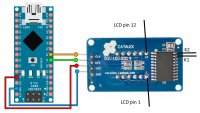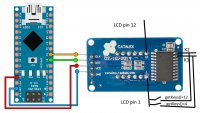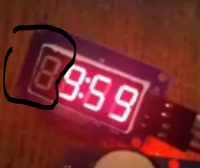/*
РАСШИФРОВКА НАДПИСЕЙ НА ДИСПЛЕЕ:
Strt - (Start) начало работы, инициализация SD карты. Эту надпись можно успеть
прочитать только при запуске в режиме загрузки
PreP - (Perparing) подготовка к преобразованию изображений
LOAd - (Loading) преобразование и загрузка изображений
read - (Reading) чтение преобразованных изображений с карты
rdy - (Ready) готов к работе
Proc - (Processing) показываем анимацию
НАСТРОЙКИ:
Br** - (Brightness) настройка яркости (в процентах, 10-95)
Fr** - (Frame) номер изображения, которое будет показано при нажатии на кнопку
SP** - (Speed) скорость анимации (в процентах, 0-95)
ОШИБКИ:
Sder - (SD error) ошибка подключения SD карты (карта не подключена, карта сломана, карта не подходит)
FrEr - (Frame Error) ошибка при чтении картинки. Возникает на разных стадиях, подробнее видно с компьютера
Ferr - (Fatal error) критическая ошибка, работа остановлена. Возникает на разных стадиях, подробнее видно с компьютера
*/
// ------------------------------ НАСТРОЙКИ ------------------------------
#define N_LEDS 144 // количество светодиодов (максимум 170 !!!)
#define FLIP_H 0 // зеркально отражать изображения по горизонтали
#define CURRENT_MAX 2000 // максимальный ток (авто-ограничение по расчёту яркости)
#define DEBUG 0 // отправка информации в порт, 1-вкл, 0-выкл
#define ENC_TYPE 1 // тип энкодера (1 и 0) если двоит/мельчит, смени тип
// ПРИ ВЫКЛЮЧЕННОМ DEBUG СИСТЕМА РАБОТАЕТ ГОРАЗДО БЫСТРЕЕ!!
// ------------------------------ НАСТРОЙКИ ------------------------------
// ----------------------- ПОДКЛЮЧЕНИЕ -----------------------
#define TRIGGER 2 // кнопка запуска анимации
#define CLK_ENC 3 // ПИН CLK ЭНКОДЕРА
#define DT_ENC 4 // ПИН DT ЭНКОДЕРА
// CLK и DT можно менять местами, чтобы инвертировать направление
#define SW_ENC 5 // ПИН SW ЭНКОДЕРА
#define DIO 6 // ДИСПЛЕЙ
#define CLK 7 // ДИСПЛЕЙ
#define LED_PIN 8 // пин DIN ленты
// SD card module: CLK (SCK) -> D13, MOSI -> D11, MISO -> D12, CS -> D10
#define CARD_SELECT 10 // CS пин карты
// ----------------------- ПОДКЛЮЧЕНИЕ -----------------------
// ---- БИБЛИОТЕКИ ----
#include <SdFat.h>
#include <avr/pgmspace.h>
#include "./gamma.h"
#include "TM1637.h"
#include "EEPROMex.h"
TM1637 tm1637(CLK, DIO);
// ---- БИБЛИОТЕКИ ----
// ----------------------- ДЛЯ РАЗРАБОТЧИКОВ ----------------------
byte NORM_STEP = 1; // шаг изменения переменной norm_counter при вращении
#define HOLD_STEP 5 // шаг изменения переменной hold_counter при нажатии, удерживании и вращении
#define OVERHEAD 150 // Extra microseconds for loop processing, etc.
uint8_t sdBuf[512], // One SD block (also for NeoPixel color data)
pinMask; // NeoPixel pin bitmask
uint16_t maxLPS, // Max playback lines/sec
nFrames = 0, // Total # of image files
frame = 0; // Current image # being painted
uint32_t firstBlock, // First block # in temp working file
nBlocks; // Number of blocks in file
SdFat sd; // SD filesystem
volatile uint8_t *port; // NeoPixel PORT register
boolean bmpProcess(char *inName, char *outName, uint8_t *brightness);
uint32_t block = 0; // Current block # within file
boolean stopFlag = false; // If set, stop playback loop
uint32_t lastBlock;
char infile[13];
SdFile tmp;
char norm_counter, hold_counter;
boolean DT_now, DT_last, SW_state, turn_flag, SWstate, SWlast;
byte anim_speed;
// ----------------------- ДЛЯ РАЗРАБОТЧИКОВ -----------------------
void setup() {
Serial.begin(57600);
if (EEPROM.read(0) != 1) { // если это САМЫЙ ПЕРВЫЙ запуск
EEPROM.write(0, 1); // запомнить, что первый запуск был
EEPROM.writeByte(1, 50); // ячейка 1 - яркость (по умолчанию)
EEPROM.writeByte(3, 50); // ячейка 3 - скорость (по умолчанию)
if (DEBUG) Serial.println("first");
norm_counter = 50;
anim_speed = 50;
} else {
norm_counter = EEPROM.readByte(1); // читаем яркость
anim_speed = EEPROM.readByte(3); // читаем скорость
}
tm1637.init(); // инициализация
tm1637.set(BRIGHT_TYPICAL); // яркость, 0 - 7 (минимум - максимум)
tm1637.displayByte(_S, _t, _r, _t);
pinMode(CLK_ENC, INPUT);
pinMode(DT_ENC, INPUT);
pinMode(SW_ENC, INPUT_PULLUP);
DT_last = digitalRead(CLK);
uint8_t n, b, startupTrigger, minBrightness;
char infile[13], outfile[13];
boolean found;
uint16_t i;
SdFile tmp;
uint32_t lastBlock;
pinMode(TRIGGER, INPUT_PULLUP); // Enable pullup on trigger button
startupTrigger = digitalRead(SW_ENC); // Poll startup trigger ASAP
pinMode(LED_PIN, OUTPUT); // Enable NeoPixel output
digitalWrite(LED_PIN, LOW); // Default logic state = low
port = portOutputRegister(digitalPinToPort(LED_PIN));
pinMask = digitalPinToBitMask(LED_PIN);
memset(sdBuf, 0, N_LEDS * 3); // Clear LED buffer
show(); // Init LEDs to 'off' state
if (DEBUG) Serial.print(F("Initializing SD card..."));
if (!sd.begin(CARD_SELECT, SPI_FULL_SPEED)) {
tm1637.displayByte(_S, _d, _e, _r); // надпись Sder
error(F("failed. Things to check:\n"
"* is a card is inserted?\n"
"* Is your wiring correct?\n"
"* did you edit CARD_SELECT to match the SD shield or module?"));
}
if (DEBUG) Serial.println(F("OK"));
#if 0
if (!volume.init(&card)) {
tm1637.displayByte(_S, _d, _e, _r); // надпись Sder
error(F("Could not find FAT16/FAT32 partition.\n"
"Make sure the card is formatted."));
}
root.openRoot(&volume);
#endif
if (startupTrigger == LOW) { // если при запуске кнопка НАЖАТА
while (digitalRead(SW_ENC) == LOW); // ждём отпускания кнопки
tm1637.displayByte(_P, _r, _e, _P);
minBrightness = 255;
do {
sprintf(infile, "frame%03d.bmp", nFrames);
b = 255; // Assume frame at full brightness to start...
// ...it's then modified by the bmpProcess() function here to the
// actual brightness limit the UBEC can sustain for *this image*.
if (found = bmpProcess(infile, NULL, &b)) {
nFrames++;
if (b < minBrightness) minBrightness = b;
}
} while (found && (nFrames < 1000));
if (DEBUG) Serial.print(nFrames);
if (DEBUG) Serial.print(" frames\nbrightness = ");
if (DEBUG) Serial.println(minBrightness);
tm1637.displayByte(0, _b);
tm1637.displayByte(1, _r);
NORM_STEP = 5;
tm1637.displayInt(norm_counter);
for (;;) {
encoderTick();
if (turn_flag) {
norm_counter = constrain(norm_counter, 10, 95);
tm1637.displayInt(norm_counter);
turn_flag = false;
}
if (digitalRead(SW_ENC) == LOW) break;
}
NORM_STEP = 1;
minBrightness = map(norm_counter, 0, 95, 1, minBrightness);
EEPROM.updateByte(1, norm_counter); // записываем новую яркость в память
norm_counter = 0;
tm1637.displayByte(_L, _O, _A, _d);
for (i = 0; i < nFrames; i++) {
sprintf(infile , "frame%03d.bmp", i);
sprintf(outfile, "frame%03d.tmp", i);
b = minBrightness; // Reset b to safe limit on each loop iteration
bmpProcess(infile, outfile, &b);
}
} else { // если кнопка НЕ НАЖАТА при старте - используем преобразованные картинки!
tm1637.displayByte(_r, _e, _a, _d);
do { // Scan for files to get nFrames
sprintf(infile, "frame%03d.tmp", nFrames);
if (found = tmp.open(infile, O_RDONLY)) {
if (tmp.contiguousRange(&firstBlock, &lastBlock)) {
nFrames++;
}
tmp.close();
}
} while (found);
} // end startupTrigger test
for (i = 0; i < nFrames; i++) { // Scan all files
sprintf(infile, "frame%03d.tmp", i);
tmp.open(infile, O_RDONLY);
tmp.contiguousRange(&firstBlock, &lastBlock);
nBlocks = tmp.fileSize() / 512;
tmp.close();
n = (uint16_t)(1000000L / // 1 uSec /
(((benchmark(firstBlock, nBlocks) * 21) / 20) + // time + 5% +
(N_LEDS * 30L) + OVERHEAD)); // 30 uSec/pixel
if (n > maxLPS) maxLPS = n;
}
if (maxLPS > 400) maxLPS = 400; // NeoPixel PWM rate is ~400 Hz
if (DEBUG) Serial.print(F("Max lines/sec: "));
if (DEBUG) Serial.println(maxLPS);
// Set up Timer1 for 64:1 prescale (250 KHz clock source),
// fast PWM mode, no PWM out.
TCCR1A = _BV(WGM11) | _BV(WGM10);
TCCR1B = _BV(WGM13) | _BV(WGM12) | _BV(CS11) | _BV(CS10);
// Timer0 interrupt is disabled for smoother playback.
// This means delay(), millis(), etc. won't work after this.
TIMSK0 = 0;
if (DEBUG) Serial.println(F("Setup done"));
tm1637.displayByte(_r, _d, _y, _empty);
delay(500);
hold_counter = anim_speed;
norm_counter = 0;
}
// Обработчик ошибки. Полностью вешает систему
static void error(const __FlashStringHelper *ptr) {
if (DEBUG) Serial.println(ptr); // Show message
tm1637.displayByte(_F, _e, _r, _r);
for (;;); // and hang
}
boolean _new_step;
void encoderTick() {
SWstate = digitalRead(SW_ENC);
if (SWstate != SWlast) {
SWlast = SWstate;
turn_flag = true; // флаг что был поворот ручки энкодера
}
DT_now = digitalRead(CLK_ENC); // читаем текущее положение CLK
if (DT_now != DT_last) { // если предыдущее и текущее положение CLK разные, значит был поворот
if (ENC_TYPE) _new_step = !_new_step;
if (_new_step) {
if (digitalRead(DT_ENC) != DT_now) { // если состояние DT отличается от CLK, значит крутим по часовой стрелке
if (SWstate) norm_counter += NORM_STEP;
else hold_counter += HOLD_STEP;
} else { // если совпадают, значит против часовой
if (SWstate) norm_counter -= NORM_STEP;
else hold_counter -= HOLD_STEP;
}
}
turn_flag = true; // флаг что был поворот ручки энкодера
}
DT_last = DT_now; // обновить значение
}
void buffering() {
block = 0; // Current block # within file
stopFlag = false; // If set, stop playback loop
// Get existing contiguous tempfile info
sprintf(infile, "frame%03d.tmp", frame);
if (!tmp.open(infile, O_RDONLY)) {
error(F("Could not open NeoPixel tempfile for input"));
}
if (!tmp.contiguousRange(&firstBlock, &lastBlock)) {
error(F("NeoPixel tempfile is not contiguous"));
}
nBlocks = tmp.fileSize() / 512;
tmp.close(); // File handle is no longer accessed, just block reads
sd.card()->readBlock(firstBlock, sdBuf);
}
// PLAYBACK LOOP -------------------------------------------------------------------------------
void loop() {
buffering();
tm1637.clearDisplay();
tm1637.displayByte(0, _F);
tm1637.displayByte(1, _r);
tm1637.displayInt(frame);
while (digitalRead(TRIGGER)) { // ждём нажатия кнопки !!!
encoderTick();
if (turn_flag) {
if (SWstate) { // если НЕ НАЖАТА кнопка энкодера
norm_counter = constrain(norm_counter, 0, nFrames - 1);
frame = norm_counter;
tm1637.clearDisplay();
tm1637.displayByte(0, _F);
tm1637.displayByte(1, _r);
tm1637.displayInt(frame);
buffering();
} else { // если НАЖАТА кнопка энкодера
hold_counter = constrain(hold_counter, 0, 95);
anim_speed = hold_counter;
tm1637.clearDisplay();
tm1637.displayByte(0, _S);
tm1637.displayByte(1, _P);
tm1637.displayInt(anim_speed);
}
turn_flag = false;
}
}
tm1637.displayByte(_P, _r, _o, _c);
uint32_t linesPerSec = map(anim_speed, 0, 95, 10, maxLPS); // настройка скорости
EEPROM.updateByte(3, anim_speed); // записываем новую скорость в память
OCR1A = (F_CPU / 64) / linesPerSec; // Timer1 interval
// ------------ бесконечный цикл
for (;;) { // бесконечный цикл
while (!(TIFR1 & _BV(TOV1))); // Wait for Timer1 overflow
TIFR1 |= _BV(TOV1); // Clear overflow bit
show(); // отобразить линию
if (stopFlag) break; // выходим из цикла, если stopFlag
if (++block >= nBlocks) { // показали последний блок
if (digitalRead(TRIGGER) == HIGH) { // если отпустили кнопку
memset(sdBuf, 0, N_LEDS * 3); // прекращаем показывать картинку
stopFlag = true; // флаг на выключение
continue;
} // если кнопка всё ещё удерживается
block = 0; // начать сначала!
}
sd.card()->readBlock(block + firstBlock, sdBuf); // загрузить следующий блок с карты памяти
}
// ------------ бесконечный цикл
}
// BMP->NEOPIXEL FILE CONVERSION ---------------------------------------------
#define BMP_BLUE 0 // BMP and NeoPixels have R/G/B color
#define BMP_GREEN 1 // components in different orders.
#define BMP_RED 2 // (BMP = BGR, Neo = GRB)
#define NEO_GREEN 0
#define NEO_RED 1
#define NEO_BLUE 2
boolean bmpProcess(
char *inName,
char *outName,
uint8_t *brightness) {
SdFile inFile, // Windows BMP file for input
outFile; // NeoPixel temp file for output
boolean ok = false, // 'true' on valid BMP & output file
flip = FLIP_H; // 'true' if image stored top-to-bottom
int bmpWidth, // BMP width in pixels
bmpHeight, // BMP height in pixels
bmpStartCol, // First BMP column to process (crop/center)
columns, // Number of columns to process (crop/center)
row, // Current image row (Y)
column; // and column (X)
uint8_t *ditherRow, // 16-element dither array for current row
pixel[3], // For reordering color data, BGR to GRB
b = 0, // 1 + *brightness
d, // Dither value for row/column
color, // Color component index (R/G/B)
raw, // 'Raw' R/G/B color value
corr, // Gamma-corrected R/G/B
*ledPtr, // Pointer into sdBuf (output)
*ledStartPtr; // First LED column to process (crop/center)
uint16_t b16; // 16-bit dup of b
uint32_t bmpImageoffset, // Start of image data in BMP file
lineMax = 0L, // Cumulative brightness of brightest line
rowSize, // BMP row size (bytes) w/32-bit alignment
sum, // Sum of pixels in row
startTime = millis();
if (brightness) b = 1 + *brightness; // Wraps around, fun with maths
else if (NULL == outName) return false; // MUST pass brightness for power est.
if (DEBUG) Serial.print(F("Reading file '"));
if (DEBUG) Serial.print(inName);
if (DEBUG) Serial.print(F("'..."));
if (!inFile.open(inName, O_RDONLY)) {
tm1637.displayByte(_F, _r, _E, _r);
if (DEBUG) Serial.println(F("error"));
return false;
}
if (inFile.read(sdBuf, 34) && // Load header
(*(uint16_t *)&sdBuf[ 0] == 0x4D42) && // BMP signature
(*(uint16_t *)&sdBuf[26] == 1) && // Planes: must be 1
(*(uint16_t *)&sdBuf[28] == 24) && // Bits per pixel: must be 24
(*(uint32_t *)&sdBuf[30] == 0)) { // Compression: must be 0 (none)
// Supported BMP format -- proceed!
bmpImageoffset = *(uint32_t *)&sdBuf[10]; // Start of image data
bmpWidth = *(uint32_t *)&sdBuf[18]; // Image dimensions
bmpHeight = *(uint32_t *)&sdBuf[22];
// That's some nonportable, endian-dependent code right there.
if (DEBUG) Serial.print(bmpWidth);
Serial.write('x');
if (DEBUG) Serial.print(bmpHeight);
if (DEBUG) Serial.println(F(" pixels"));
if (outName) { // Doing conversion? Need outFile.
// Delete existing outFile file (if any)
(void)sd.remove(outName);
if (DEBUG) Serial.print(F("Creating contiguous file..."));
// NeoPixel working file is always 512 bytes (one SD block) per row
if (outFile.createContiguous(sd.vwd(), outName, 512L * bmpHeight)) {
uint32_t lastBlock;
outFile.contiguousRange(&firstBlock, &lastBlock);
outFile.close();
nBlocks = bmpHeight; // See note in setup() re: block calcs
ok = true; // outFile is good; proceed
if (DEBUG) Serial.println(F("OK"));
} else {
if (DEBUG) Serial.println(F("error"));
tm1637.displayByte(_F, _r, _E, _r);
}
} else ok = true; // outFile not needed; proceed
if (ok) { // Valid BMP and contig file (if needed) are ready
if (DEBUG) Serial.print(F("Processing..."));
rowSize = ((bmpWidth * 3) + 3) & ~3; // 32-bit line boundary
b16 = (int)b;
if (bmpHeight < 0) { // If bmpHeight is negative,bmpHeight
bmpHeight = -bmpHeight; // image is in top-down order.
flip = true; // Rare, but happens.
}
if (bmpWidth >= N_LEDS) { // BMP matches LED bar width, or crop image
bmpStartCol = (bmpWidth - N_LEDS) / 2;
ledStartPtr = sdBuf;
columns = N_LEDS;
} else { // Center narrow image within LED bar
bmpStartCol = 0;
ledStartPtr = &sdBuf[((N_LEDS - bmpWidth) / 2) * 3];
columns = bmpWidth;
memset(sdBuf, 0, N_LEDS * 3); // Clear left/right pixels
}
for (row = 0; row < bmpHeight; row++) { // For each row in image...
Serial.write('.');
inFile.seekSet(
bmpImageoffset + (bmpStartCol * 3) + (rowSize * (flip ?
(bmpHeight - 1 - row) : // Image is stored top-to-bottom
row))); // Image stored bottom-to-top
if (!inFile.read(ledStartPtr, columns * 3)) { // Load row
if (DEBUG) Serial.println(F("Read error"));
tm1637.displayByte(_F, _r, _E, _r);
}
sum = 0L;
ditherRow = (uint8_t *)&dither[row & 0x0F]; // Dither values for row
ledPtr = ledStartPtr;
for (column = 0; column < columns; column++) { // For each column...
if (b) { // Scale brightness, reorder R/G/B
pixel[NEO_BLUE] = (ledPtr[BMP_BLUE] * b16) >> 8;
pixel[NEO_GREEN] = (ledPtr[BMP_GREEN] * b16) >> 8;
pixel[NEO_RED] = (ledPtr[BMP_RED] * b16) >> 8;
} else { // Full brightness, reorder R/G/B
pixel[NEO_BLUE] = ledPtr[BMP_BLUE];
pixel[NEO_GREEN] = ledPtr[BMP_GREEN];
pixel[NEO_RED] = ledPtr[BMP_RED];
}
d = pgm_read_byte(&ditherRow[column & 0x0F]); // Dither probability
for (color = 0; color < 3; color++) { // 3 color bytes...
raw = pixel[color]; // 'Raw' G/R/B
corr = pgm_read_byte(&gamma[raw]); // Gamma-corrected
if (pgm_read_byte(&bump[raw]) > d) corr++; // Dither up?
*ledPtr++ = corr; // Store back in sdBuf
sum += corr; // Total brightness
} // Next color byte
} // Next column
if (outName) {
if (!sd.card()->writeBlock(firstBlock + row, (uint8_t *)sdBuf)) {
if (DEBUG) Serial.println(F("Write error"));
tm1637.displayByte(_F, _r, _E, _r);
}
}
if (sum > lineMax) lineMax = sum;
} // Next row
if (DEBUG) Serial.println(F("OK"));
if (brightness) {
lineMax = (lineMax * 20) / 255; // Est current @ ~20 mA/LED
if (lineMax > CURRENT_MAX) {
// Estimate suitable brightness based on CURRENT_MAX
*brightness = (*brightness * (uint32_t)CURRENT_MAX) / lineMax;
} // Else no recommended change
}
if (DEBUG) Serial.print(F("Processed in "));
if (DEBUG) Serial.print(millis() - startTime);
if (DEBUG) Serial.println(F(" ms"));
} // end 'ok' check
} else { // end BMP header check
if (DEBUG) Serial.println(F("BMP format not recognized."));
tm1637.displayByte(_F, _r, _E, _r);
}
inFile.close();
return ok; // 'false' on various file open/create errors
}
// MISC UTILITY FUNCTIONS ----------------------------------------------------
// Estimate maximum block-read time for card (microseconds)
static uint32_t benchmark(uint32_t block, uint32_t n) {
uint32_t t, maxTime = 0L;
do {
t = micros();
sd.card()->readBlock(block++, sdBuf);
if ((t = (micros() - t)) > maxTime) maxTime = t;
} while (--n);
return maxTime;
}
// NEOPIXEL FUNCTIONS --------------------------------------------------------
static void show(void) {
volatile uint16_t
i = N_LEDS * 3; // Loop counter
volatile uint8_t
*ptr = sdBuf, // Pointer to next byte
b = *ptr++, // Current byte value
hi, // PORT w/output bit set high
lo, // PORT w/output bit set low
next,
bit = 8;
noInterrupts();
hi = *port | pinMask;
lo = *port & ~pinMask;
next = lo;
asm volatile(
"head20_%=:" "\n\t"
"st %a[port], %[hi]" "\n\t"
"sbrc %[byte], 7" "\n\t"
"mov %[next], %[hi]" "\n\t"
"dec %[bit]" "\n\t"
"st %a[port], %[next]" "\n\t"
"mov %[next] , %[lo]" "\n\t"
"breq nextbyte20_%=" "\n\t"
"rol %[byte]" "\n\t"
"rjmp .+0" "\n\t"
"nop" "\n\t"
"st %a[port], %[lo]" "\n\t"
"nop" "\n\t"
"rjmp .+0" "\n\t"
"rjmp head20_%=" "\n\t"
"nextbyte20_%=:" "\n\t"
"ldi %[bit] , 8" "\n\t"
"ld %[byte] , %a[ptr]+" "\n\t"
"st %a[port], %[lo]" "\n\t"
"nop" "\n\t"
"sbiw %[count], 1" "\n\t"
"brne head20_%=" "\n"
: [port] "+e" (port),
[byte] "+r" (b),
[bit] "+r" (bit),
[next] "+r" (next),
[count] "+w" (i)
: [ptr] "e" (ptr),
[hi] "r" (hi),
[lo] "r" (lo));
interrupts();
// There's no explicit 50 uS delay here as with most NeoPixel code;
// SD card block read provides ample time for latch!
}







